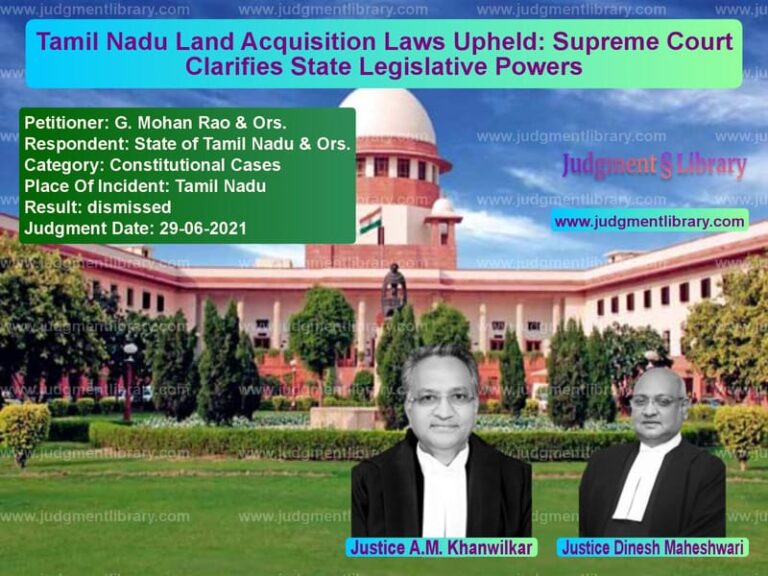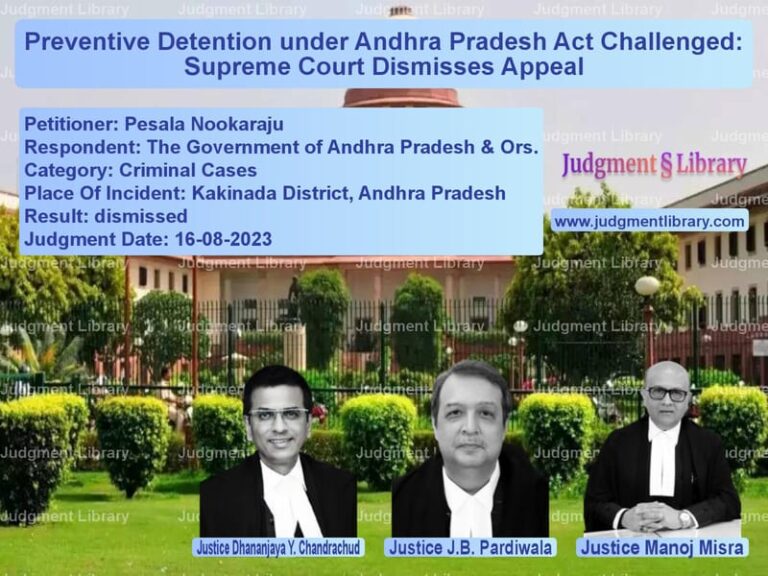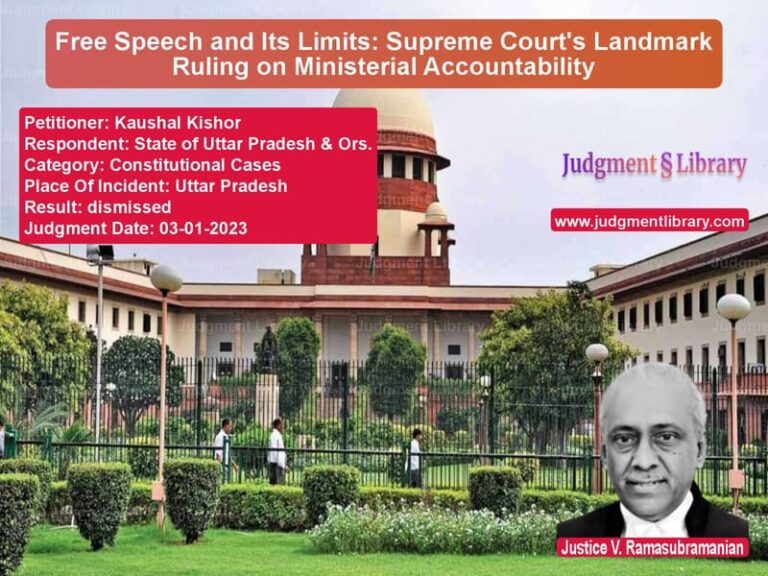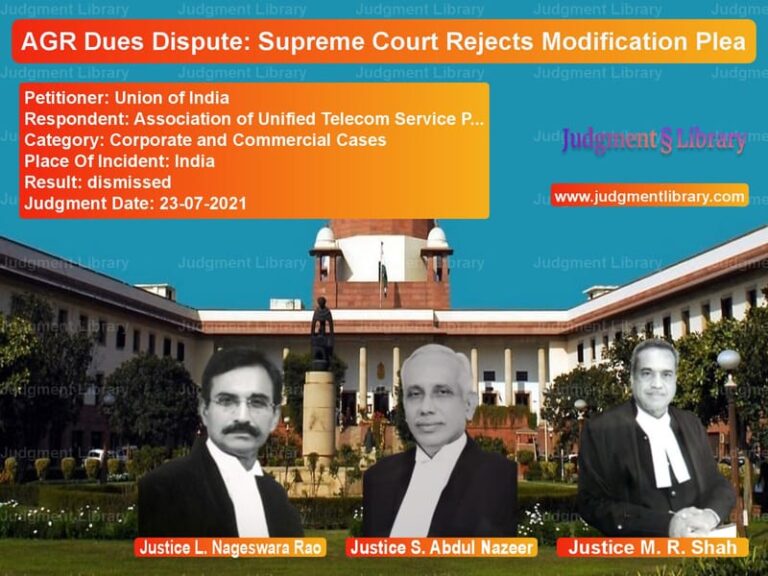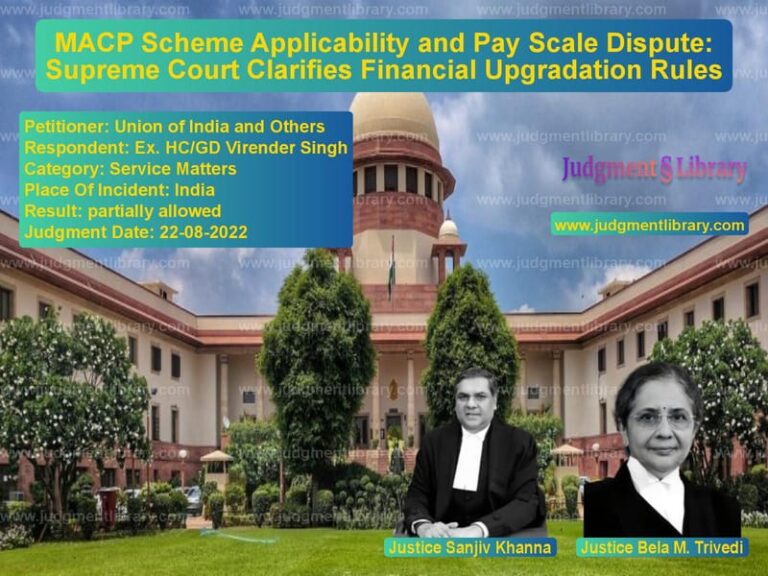Stamp Duty and Specific Performance of Agreements: A Case Analysis of Vijay Kumar Goyal v. Neena Rani & Ors.
The case of Vijay Kumar Goyal v. Neena Rani & Ors. involves a dispute regarding the stamp duty on the agreements related to the sale of land and the subsequent claim for specific performance. The appellant, Vijay Kumar Goyal, sought specific performance of the Memorandum of Agreement dated 24th February 1996 and the Agreement to Sell dated 14th May 2011 concerning the suit land. However, a legal issue arose regarding the stamp duty levied on these agreements, leading to a decision by the High Court of Punjab and Haryana. The Supreme Court was then approached, which eventually quashed the High Court’s judgment and the Trial Court’s order, thereby ruling in favor of the appellant. This blog post provides an in-depth analysis of the arguments, legal reasoning, and the final outcome in this case.
Background of the Case
The appellant, Vijay Kumar Goyal, was the original owner of a piece of land in Punjab, which was subject to acquisition for the purpose of sale under two agreements: the Memorandum of Agreement (1996) and the Agreement to Sell (2011). The agreements specified that the appellant was in possession of the land, and the defendant parties could not claim possession through these agreements. Subsequently, the appellant sought the specific performance of these agreements in the civil suit before the Trial Court. The court also raised the issue of stamp duty levied on the agreements, ruling that the appellant was required to pay the deficient stamp duty as per the relevant provisions of the Indian Stamp Act, 1899. Aggrieved by the decision, the appellant filed a revision petition before the High Court, which dismissed it. The appellant then approached the Supreme Court.
Petitioner’s Arguments
The appellant, Vijay Kumar Goyal, presented the following arguments in favor of his case:
- Possession of Land: The appellant argued that the agreements in question did not contemplate the transfer of possession of the land as the appellant had already been in possession prior to the execution of the agreements. He emphasized that since possession was not transferred under the agreements, the stamp duty should not be calculated as per the provisions applicable when possession is delivered.
- Stamp Duty Calculation: The appellant claimed that the stamp duty should not be levied under Entry 5 of Schedule 1-A of the Indian Stamp Act as amended by the State of Punjab, as it applied only when the possession was delivered. Since the appellant was already in possession of the land, he argued that the stamp duty calculation should not follow that entry, which imposes a higher rate of duty for agreements transferring possession.
- Relief in Specific Performance Suit: The appellant emphasized that the main issue in his suit was the enforcement of specific performance of the agreements, not the issue of stamp duty. He argued that the focus of the case should be on the enforcement of the agreements and not on technicalities such as the stamp duty owed.
- Legal Precedents: The appellant referred to previous judicial decisions that had ruled in favor of reducing the stamp duty in cases where possession was not transferred. He argued that the application of these precedents should lead to the quashing of the Trial Court’s order for the payment of deficient stamp duty and penalty.
Respondent’s Arguments
The respondents, including Neena Rani and others, made the following counterarguments in support of their position:
- Stamp Duty Applicability: The respondents argued that the agreements in question were subject to stamp duty as per Entry 5 of Schedule 1-A of the Indian Stamp Act, since the agreements were related to the sale of immovable property. They contended that regardless of possession, the agreements were still required to be stamped at the applicable rate under the law.
- Proper Transfer of Land: The respondents emphasized that the appellant was bound by the legal requirements for transferring the land, including the necessary stamp duty. They argued that the agreements were properly executed but were incomplete in terms of stamp duty payment, necessitating the payment of deficient duty with a penalty.
- Compliance with the Law: The respondents also argued that the appellant should be required to comply with the legal stipulations regarding stamp duty, as failure to do so would undermine the integrity of the transaction. They emphasized that the application of the penalty for deficient duty was justified and that the appellant’s refusal to pay was unjustified.
The Court’s Reasoning
The Supreme Court, after considering the arguments from both sides, made the following observations:
- Possession and Stamp Duty: The Court emphasized that the agreements in question did not involve the transfer of possession of the land, as the appellant was already in possession at the time the agreements were executed. The Court noted that the relevant provision in the Stamp Act applies when possession is transferred, but in this case, since the appellant remained in possession, it was not appropriate to apply the higher stamp duty rate.
- Interpretation of Entry 5 of Schedule 1-A: The Court interpreted Entry 5 of Schedule 1-A of the Indian Stamp Act in the context of the appellant’s case. The Court concluded that the provision for stamp duty does not apply in cases where possession is not transferred, and thus, the appellant should not be liable for the deficient stamp duty as per the trial court’s order.
- Specific Performance of Agreements: The Court reiterated the importance of specific performance of agreements and emphasized that the appellant had a valid claim for enforcement of the agreements. However, the issue of stamp duty and the penalty imposed should be dealt with separately, as it did not affect the main suit for specific performance.
- Equitable Principles: The Court applied equitable principles to assess the situation. It concluded that the appellant’s failure to pay the correct stamp duty should not prejudice his claim for specific performance, and that the excess penalty imposed by the Trial Court was unwarranted.
- Quashing of High Court’s Order: The Court found that the High Court had incorrectly upheld the Trial Court’s order requiring the appellant to pay the deficient stamp duty and penalty. The Court quashed the High Court’s judgment and the Trial Court’s order, ruling that the appellant should not be liable for the additional stamp duty or penalty.
The Court’s Decision
The Supreme Court issued the following orders:
- Quashing of Trial Court’s Order: The Court quashed the Trial Court’s order directing the appellant to pay deficient stamp duty along with the penalty under Entry 5 of Schedule 1-A of the Indian Stamp Act.
- Dismissal of High Court’s Judgment: The Court also dismissed the High Court’s judgment that had upheld the Trial Court’s decision. The Court held that the appellant should not be required to pay the additional stamp duty or penalty.
- Relief for the Appellant: The Court allowed the appellant’s appeal and ruled that the specific performance of the agreements should proceed without any further complications related to stamp duty.
Conclusion
This case highlights the importance of proper stamp duty assessment in real estate transactions and the application of specific performance principles. The Supreme Court’s decision reinforces that stamp duty requirements should be assessed based on the actual transfer of possession and not on technicalities. The judgment also illustrates the Court’s approach to ensuring that appellants are not unduly penalized for procedural issues when they have a valid claim for relief, particularly in matters concerning property transactions and enforcement of agreements.
Read also: https://judgmentlibrary.com/court-orders-coercive-action-against-husband-in-pending-us-case/
Petitioner Name: Vijay Kumar Goyal.Respondent Name: Neena Rani & Ors..Judgment By: Justice M.R. Shah, Justice Krishna Murari.Place Of Incident: Punjab.Judgment Date: 16-09-2022.
Don’t miss out on the full details! Download the complete judgment in PDF format below and gain valuable insights instantly!
Download Judgment: vijay-kumar-goyal-vs-neena-rani-&-ors.-supreme-court-of-india-judgment-dated-16-09-2022.pdf
Directly Download Judgment: Directly download this Judgment
See all petitions in Contract Disputes
See all petitions in Property Disputes
See all petitions in Damages and Compensation
See all petitions in Debt Recovery
See all petitions in Judgment by Mukeshkumar Rasikbhai Shah
See all petitions in Judgment by Krishna Murari
See all petitions in allowed
See all petitions in supreme court of India judgments September 2022
See all petitions in 2022 judgments
See all posts in Civil Cases Category
See all allowed petitions in Civil Cases Category
See all Dismissed petitions in Civil Cases Category
See all partially allowed petitions in Civil Cases Category



